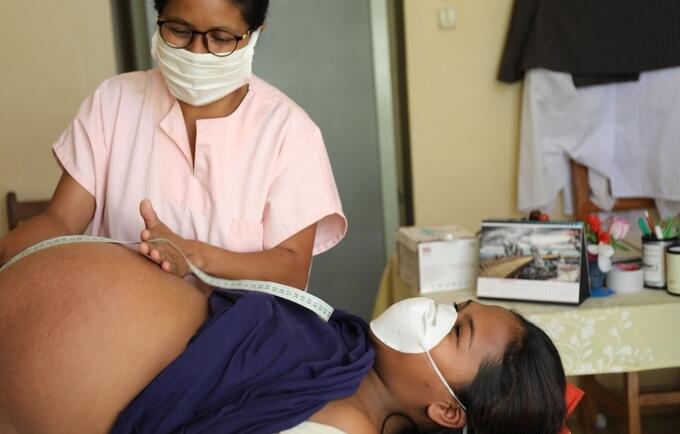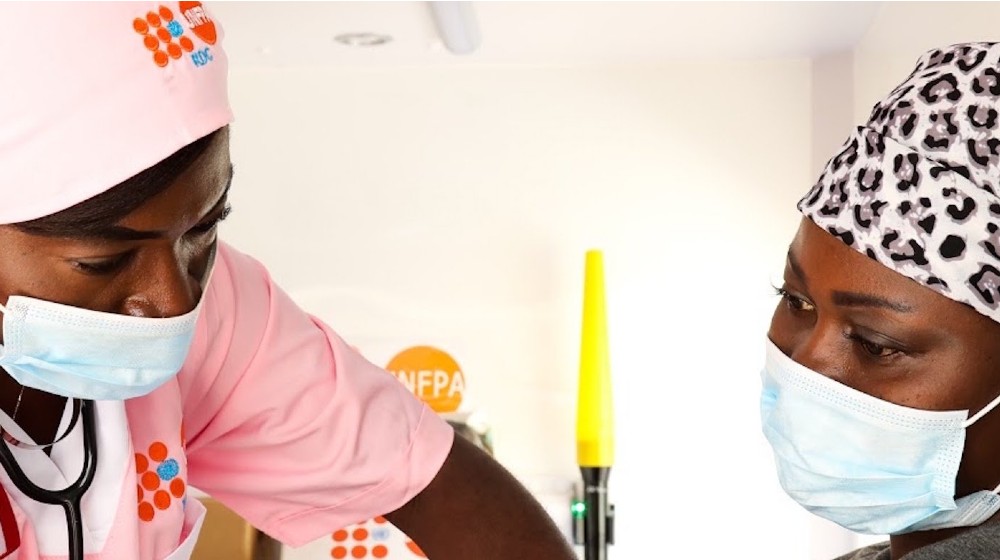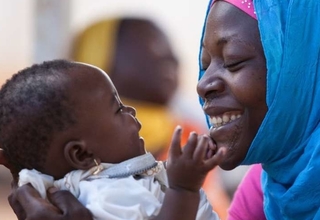ANTANANARIVO, Madagascar—In her last month of pregnancy, Aina, 24, has decided to give birth safely at hospital. But a partial lockdown has been put in place by the government in response to the COVID-19 pandemic. Included is the suspension of public transport.
“As it’s [my] first time, I’m worried,” Aina says.
It concerns her deeply that her local hospital, Itaosy District Hospital of Reference, is a two-hour walk away. This is her first pregnancy and like most first-time mothers, she wants things to go smoothly. But due to this unprecedented pandemic things are not running as they normally would.
Usually, Itaosy hospital manages 10 to 15 deliveries and holds 20 to 30 prenatal consultations a day. Yet on this day, just two women visited the obstetrical care service for a prenatal consultation. It is clear the pandemic is having a considerable impact on hospital attendance.
Without proper medical care, the lives of pregnant women and their babies are at grave risk. This is why the Ministry of Public Health and UNFPA, the United Nations sexual and reproductive health agency have stepped in.
On a social media platform, Aina discovers the good news. She reads that free transport is being arranged by the government to ensure that pregnant women can access hospitals in Antananarivo and Toamasina, with UNFPA’s support.
Without that free transport I would have walked for two hours in the sun with my big belly. It could have been quite risky.
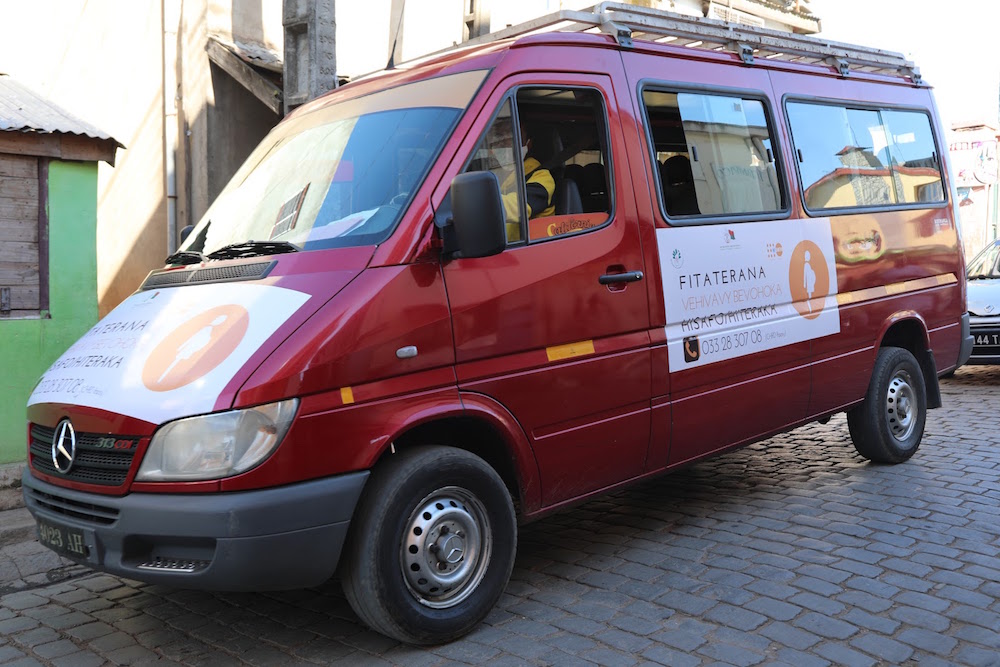
Just two weeks from her due date, the soon-to-be mum is relieved. She makes arrangements and arrives at Itaosy hospital for an important check-up. Here, she is examined by midwife Bakoly Rasoamanontany.
“Everything is okay. Mother and baby are fine,” reassures the midwife and she makes an appointment for Aina’s special day.
Aina is grateful that she has been given the medical attention she requires. “Without that free transport I would have walked for two hours in the sun with my big belly. It could have been quite risky as I am a few weeks away from my expected delivery date,” she says.
She is thankful for the assistance. “Honestly, it helps us a lot, especially in this period of confinement when no public transport is available. I can say that I was lucky!”
Even in times of crisis, like the coronavirus pandemic, pregnant women and girls need access to care. Aina was able to benefit from the free transport service, and there will be many more like her. The free service is due to last for one month.
Normally, we would have taken a taxi. Now, with the various restrictions and hygiene measures [in place], it has become difficult even to ask for the services of relatives.

A baby's life at risk
It is 1 p.m. on 16 April, just one hour after Madagascar’s lockdown came into effect. Sonia is in labour. She needs to get to hospital to give birth but people are no longer allowed outside their homes.
"Normally, we would have taken a taxi,” says Sonia’s aunt . “Now, with the various restrictions and hygiene measures [in place], it has become difficult even to ask for the services of relatives."
At this stage, Sonia doesn’t yet know that the life of her baby stands at risk.
When they phone her doctor, they’re given the good news that women like her are being especially assisted. They’re relieved.
"Fortunately, the doctor informed us of the existence of this free transport for pregnant women,” says her aunt. “We called immediately and prepared to leave.” Within just 20 minutes, the special transport arrives to take her to Befelatanana hospital. There, she is taken into the care of the Emergency services.
It is during the ultrasound scan that the dangerous position of Sonia’s baby is detected. A decision is quickly made to admit her for an emergency Caesarean section. Then another piece of good news is imparted. The maternity ward has been equipped with UNFPA-supported emergency delivery kits. Sonia receives hers just in time.
We will return home with the same transport and I can tell you, frankly, this service is a blessing!
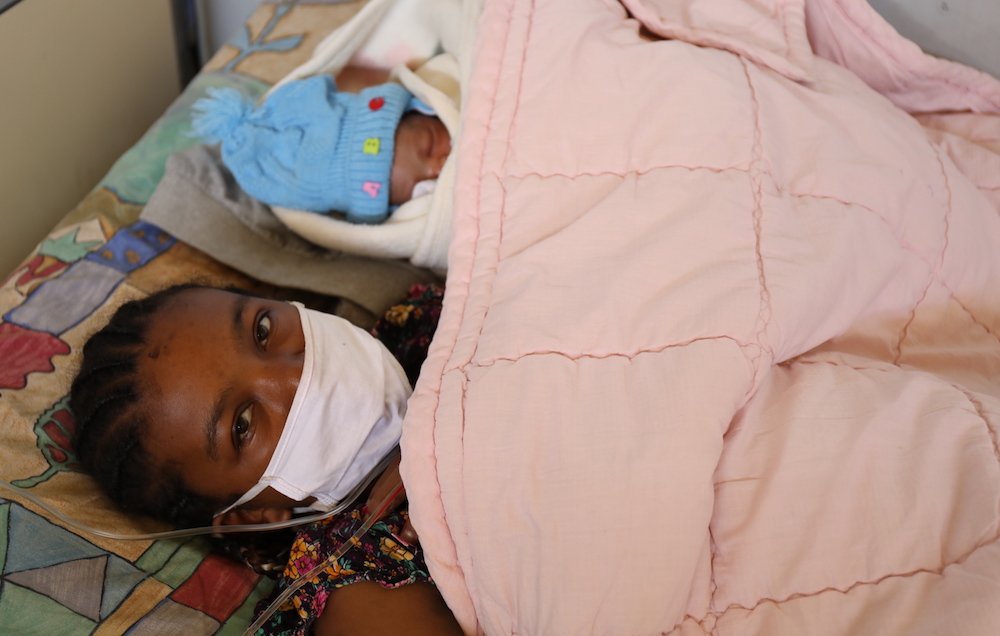
In safe hands
At 3 p.m., baby Yanaël takes his first breath and cries. Under the care of the hospital’s professional nursing staff, mother and baby are both safe and in good health.
In the maternity ward with them are ten other young mothers who have been assisted by the staff to give birth. Many of them arrived at the hospital on foot, some walking for as long as two hours to ensure that, like Sonia, they gave birth safely.
Now, all of them are looking forward to going home. And when they do, they will ensure that other pregnant women in their communities hear about the free transport service.
“We will return home with the same transport and I can tell you, frankly, this service is a blessing!” says Sonia. She looks forward to taking her new baby home to her partner. In time, she plans to become a pastry chef.
* The free hospital transport for pregnant women is available twenty four hours a day and is expected to serve around 5,000 women during Madagascar’s anticipated month-long lockdown.
- Harinivo Raholimalala and Hantanirina Andremanisa
